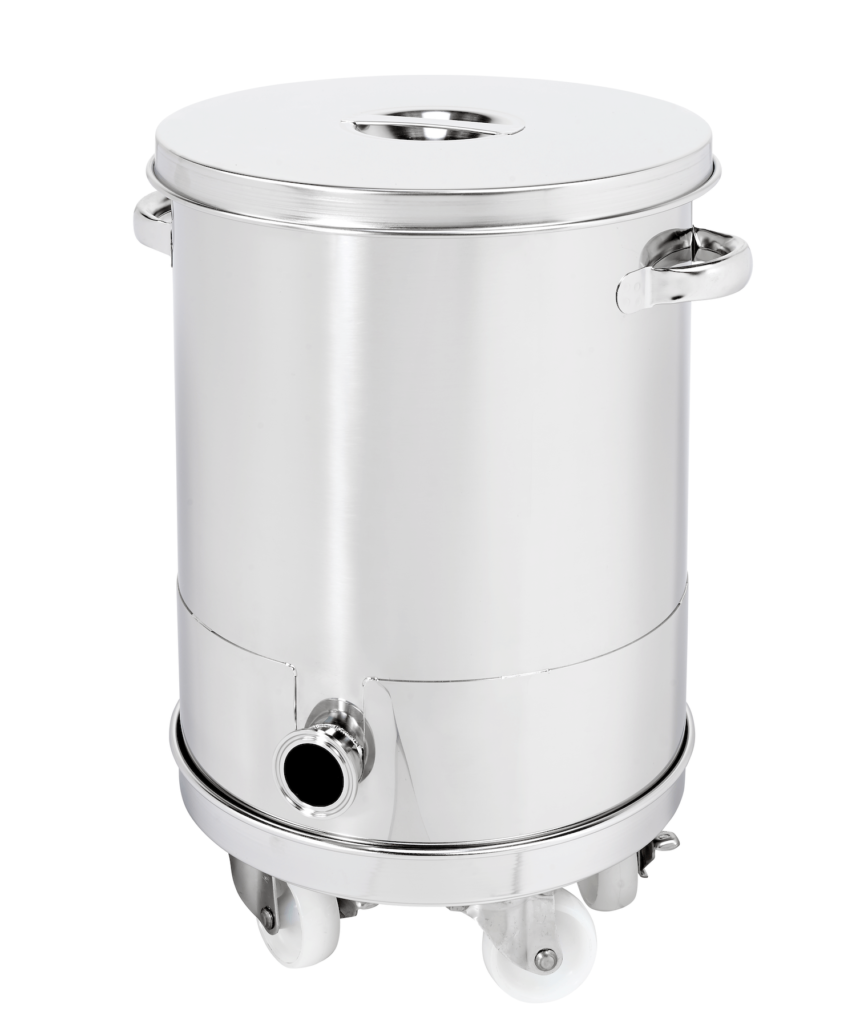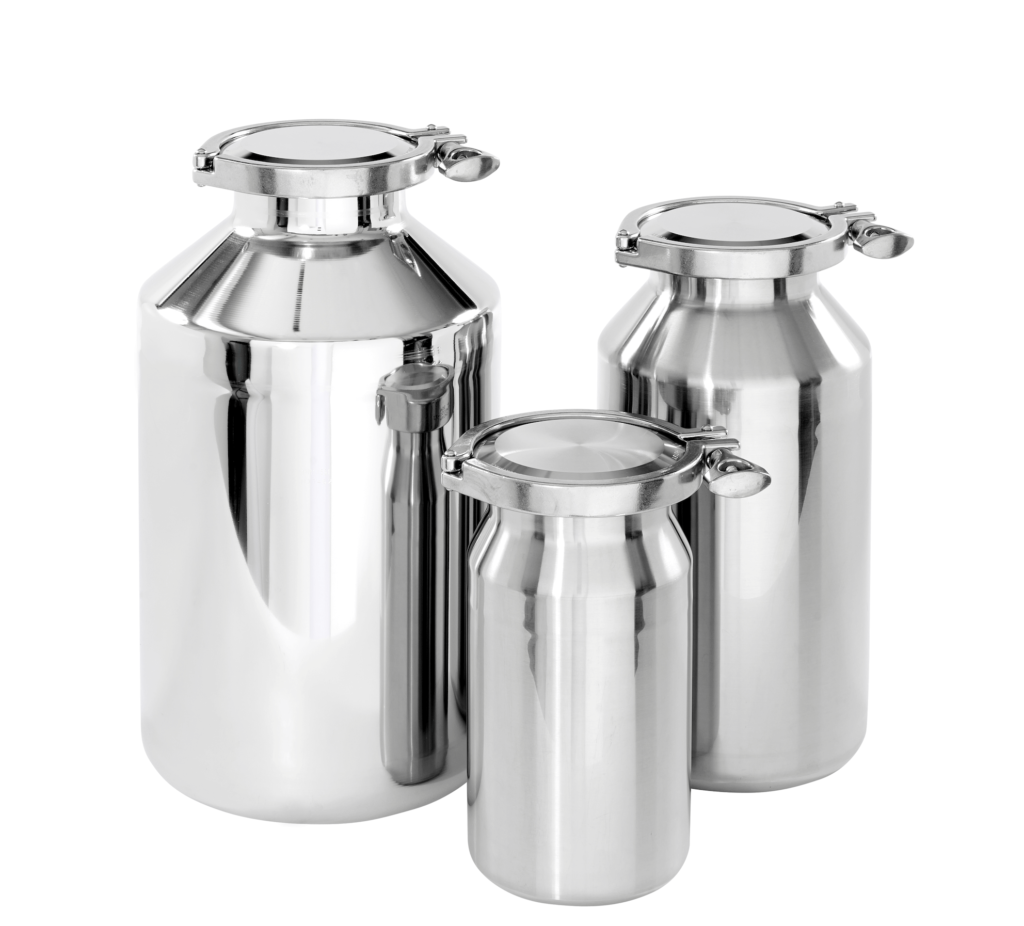Stainless steel is uniquely suited for pharmaceutical and biotech. High-temperature resistance, paired with resistance to chemical corrosion and pitting, makes it practical and durable for uses that require frequent sanitation and low chemical reactivity.

Importance of stainless steel in the pharmaceutical industry
Stainless steel bottles, containers, including tanks, are ideal for processing, storing and transporting both liquid and dry pharmaceuticals. They’re also valuable during research and manufacturing processes, along with stainless steel pressure vessels. Stainless steel is also used to produce many instruments used in the pharmaceutical industry. Commonly used stainless steel process equipment and accessories include dollies, beakers, ladles, reducers, end caps, hose barbs, clamps, and sight glasses.
Quality standards in the pharmaceutical industry
High-quality standards and strict regulations drive the importance of stainless steel in the pharmaceutical industry.
- Easily sanitized and withstand frequent sanitation: Since sanitization is critical for pharma companies, any material used must be easy to clean and withstand either harsh sanitation chemicals or intense microbe-killing heat. The right types of stainless steel can withstand both.
- Non-reactive with products: For containers and instruments in contact with medications, FDA regulations require materials that won’t be reactive with, additive to, or absorptive of the medication. The safety, strength, identity, quality, and purity of the product must be maintained and cannot be affected by the container or instruments. Medical-grade stainless steel meets these standards.
Helps maintain stable shelf-life: Pharma and biotech companies need containers that help maintain shelf-life stability of products to decrease loss through waste. The non-porous, non-reactive nature of medical-grade stainless steel helps meet this need.

Different types of stainless steel
Not all stainless steel meets the high-quality standards of the pharma and biotech industries. Though all stainless steel is an iron-based alloy that includes chromium, the exact composition varies. Different metals and metal percentages in these steel varieties affect their performance, and the type of stainless steel an industry chooses depends on that industry’s specific performance needs. Steel that meets the needs of the pharma and biotech industries is called medical-grade stainless steel.
Stainless steel can be described as austenitic, ferritic, martensitic, or duplex. It can also be grouped by composition into several categories, which are further broken down into specific grades. Several systems exist for categorizing and grading steel. One well-known system is the Society of Automotive Engineers (SAE), which uses a 3-digit system for classifying and grading stainless steel.
SAE 300 and 400 series
In the SAE system, two of the widely used grading categories are the 300 and 400 series. Each has its own advantages and disadvantages for specific applications, and they provide good examples of the diverse ways stainless steel can be used.
The 400 series consists of ferritic steels and has higher carbon and lower nickel content than some steel types. This makes it durable under physically abrasive conditions and inexpensive. It’s often used for heavy-duty agriculture and industrial applications, especially in high-friction equipment such as motors. However, the 400 series is more vulnerable than the 300 series to corrosion from chemicals, salts, and flowing water or other fluids. This eliminates it from many pharma and biotech applications. It’s also more magnetic, which can be problematic in some pharma and biotech environments.
The 300 series consists of austenitic stainless steel, and it contains metals such as nickel and molybdenum that improve resistance to chemical and liquid corrosion and pitting. This includes resistance to chlorides, including salts. The 300 series is also the least magnetic among types of steel. While the 300 series is more expensive and slightly less resistant to deterioration from hard wear and tear than the 400 series, its advantages make it superior for pharma and biotech companies. Medical-grade stainless steel comes mainly from the 300 series, with 304, 316, and 316L being commonly used grades.
Differences between 316 and 316L stainless steel
Both 316 and 316L stainless steel offer medical grade stainless steel composition, with superior corrosion and heat resistance. However, 316L has a lower percentage of carbon. By definition, its carbon percentage can’t exceed .03%.
Stainless steel fabrication
Stainless steel fabrication begins with an idea. Then the details are planned using specialized engineering software to create CAD (computer-aided design) drawings.
If you have an idea, the engineers at Eagle Stainless can help bring it into existence. We also have a library with hundreds of designs, including our own patented innovations, to choose from. Some of our custom fabrications include vessel modifications, custom dip tubes, hoppers, dish bottom mixing vessels, custom buckets, sanitary containers, and more.
Once the plan is in place, physical fabrication processes begin. Our manufacturing processes include manual and CNC machines, orbital welding, laser engraving, automated and manual mechanical polishing.
We offer stainless steel custom fabrication and modifications to standard products for both small phase clinical production and large-scale commercial production.
Best products for the pharma and biotech industry
Eagle Stainless has been providing quality stainless steel products since 1990, and we are a preferred provider for the pharma and biotech industries. We use high-quality medical-grade steel for pharmaceutical and biotech applications and provide superior finishing:
- Minimum 10Ra finish is standard on all our containers, vessels and bottles to ensure smooth, radiused, and seamless interiors.
- Custom finishing is available: passivation to remove surface contaminants and enhance the protective chromium oxide layer; electropolishing to provide an ultra-smooth finish that increases corrosion resistance and meets the highest pharmaceutical standards.
Eagle Stainless offers testing for both standard and custom fabrication products to ensure quality. Available tests include helium leak test, surface finish testing, hydrostatic pressure tests, and Coordinate Measuring Machine (CMM) for accurate dimensional tests. We also offer traceability when needed, through heat numbers that are engraved on the products.
For the best stainless steel products for your pharmaceutical and biotech applications and personalized service, call Eagle Stainless today.
